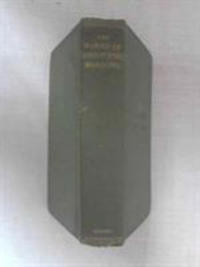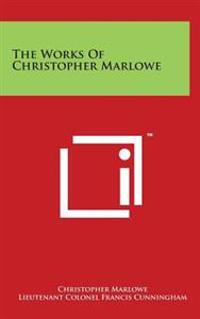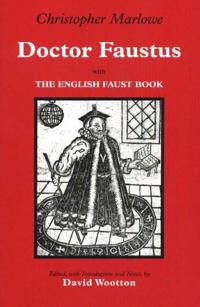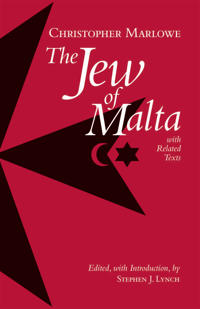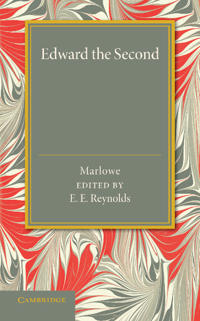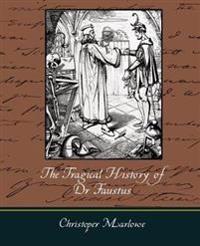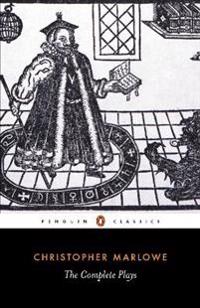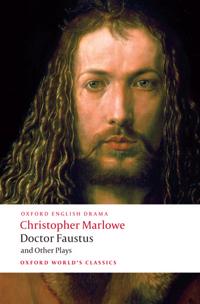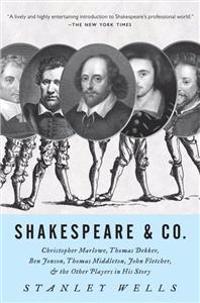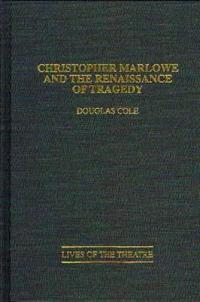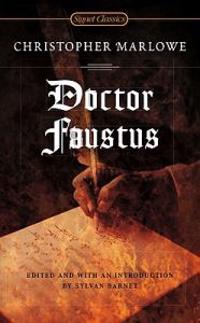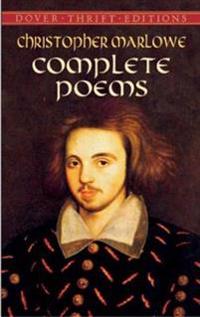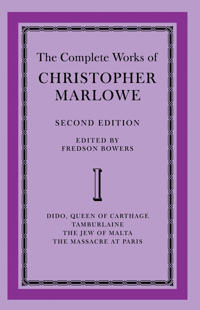Works of Christopher Marlowe (Inbunden)
avChristopher Marlowe
ISBN: 9780198113720 - UTGIVEN: 1922-02A scholarly edition of works by Christopher Marlowe. The edition presents an authoritative text, together with an introduction, commentary notes, and scholarly apparatus.[...]
Complete Works of Christopher Marlowe, The: Volume 1: All Ovids Elegies, Lucans First Booke, Dido Queene of Carthage, Hero and Leander (Inbunden)
avChristopher Marlowe
ISBN: 9780198118787 - UTGIVEN: 1986-12-18Oxford Student Texts: Christopher Marlowe: Dr Faustus (Pocket)
avChristopher Marlowe
ISBN: 9780198325994 - UTGIVEN: 2008-04-17The Dramatic Works of Christopher Marlowe. Selected. with a Prefatory Notice, Biographical (Inbunden)
avChristopher Marlowe
ISBN: 9781116911589 - UTGIVEN: 2009-11The Works of Christopher Marlowe (Inbunden)
avChristopher Marlowe, Lieutenant Colonel Francis Cunningham
ISBN: 9781494142520 - UTGIVEN: 2014-03Marlowe: Four Plays (Pocket)
avChristopher Marlowe
ISBN: 9781408149492 - UTGIVEN: 2011-10-01This New Mermaids anthology brings together the four most popular and widely studied of Christopher Marlowe's plays: Tamburlaine, Parts 1 and 2, The Jew of Malta, Edward II and Dr Faustus. The new introduction by Brian Gibbons explores the plays in the context of early modern theatre, culture and po[...]
Doctor Faustus (Pocket)
avChristopher Marlowe, David Scott Kastan, Christopher Marlowe
ISBN: 9780393977547 - UTGIVEN: 2005-01Renaissance England's great tragedy of intellectual overreaching is as relevant and unsettling today as it was when first performed. This edition provides newly edited texts of both the 1604 (A-Text) and 1616 (B-Text) versions of the play, with detailed explanatory annotations. Included are a select[...]
The Elizabethan World (Häftad)
avChristopher Marlowe, David Scott Kastan, Christopher Marlowe
ISBN: 9780415712972 - UTGIVEN: 2013-07This comprehensive and beautifully illustrated collection of essays conveys a vivid picture of a fascinating and hugely significant period in history. Featuring contributions from thirty-eight international scholars, the book takes a thematic approach to a period which saw the defeat of the Spanish [...]
Doctor Faustus (Inbunden)
avChristopher Marlowe, David Wootton, Christopher Marlowe
ISBN: 9780872207301 - UTGIVEN: 200503This edition of the 'A' text, with supporting documents that include selections from The English Life of Faustus, contemporary testimonies to Marlowe's 'atheism', and passages from the 'B' text, offers a startling new context in which to understand this play, its comedy, and its tawdry representatio[...]
The Jew of Malta (Inbunden)
avChristopher Marlowe, Stephen J. Lynch, Christopher Marlowe
ISBN: 9780872209671 - UTGIVEN: 200903This edition features a modernised text of Marlowe's play with annotation on the page, a comprehensive introduction, and related texts, including selections from Machiavelli's "Prince", Gentillet's "Anti-Machiavel", and Bacon's "The Advancement of Learning".[...]
Edward The Second (Pocket)
avChristopher Marlowe, E. E. (EDT) Reynolds, Christopher Marlowe
ISBN: 9781107426672 - UTGIVEN: 2014-08Originally published in 1955, as part of the English Literature for Schools series, this book contains the complete text of Christopher Marlowe's Edward the Second. An introduction and editorial notes are also included. This book will be of value to anyone with an interest in Marlowe and English Ren[...]
Doctor Faustus (Pocket)
avChristopher Marlowe, Michael (EDT) Keefer, Christopher Marlowe
ISBN: 9781551112107 - UTGIVEN: 2007-03Presents the classic drama of a magician's encounter with the demon Mephistopheles, and the exchange of his soul for worldly gains.[...]
The Tragical History of Dr. Faustus (Pocket)
avChristopher Marlowe, Alexander (EDT) Dyce, Christopher Marlowe
ISBN: 9781605971711 - UTGIVEN: 2008-03The Complete Plays (Storpocket)
avChristopher Marlowe
ISBN: 9780140436334 - UTGIVEN: 200311Marlowe's seven plays dramatise the fatal lure of potent forces, whether religious, occult or erotic. In the victories of Tamburlaine, Faustus' encounters with the demonic, the irreverence of Barabas in "The Jew of Malta", and the humiliation of Edward II in his fall from power and influence, Marlow[...]
Doctor Faustus and Other Plays: Tamburlaine, Parts I and II; Doctor Faustus, A- and B-Texts; the Jew of Malta; Edward II: Pts.1 & 2 (Inbunden)
avChristopher Marlowe
ISBN: 9780198121596 - UTGIVEN: 1995-02-23Doctor Faustus and Other Plays (Pocket)
avChristopher Marlowe, David Bevington, Eric Rasmussen
ISBN: 9780199537068 - UTGIVEN: 200810Christopher Marlowe (1564-1593), a man of extreme passions and a playwright of immense talent, is the most important of Shakespeare's contempories. This edition offers his five major plays, which show the radicalism and vitality of his writing in the few years before his violent death. Tamburlaine [...]
Christopher Marlowe and the Renaissance of Tragedy (Inbunden)
avDouglas Cole
ISBN: 9780313275166 - UTGIVEN: 1995-11This work focuses on Marlowe's works as an index of the major transformation of Elizabethan theatrical practices. In the opening chapter, Cole reviews the intriguing historical record of Marlowe's life outside the theatre. The body of the book addresses Marlowe's individual plays as experiments in e[...]
Tamburlaine the Great (Häftad)
avChristopher Marlowe
ISBN: 9780413775610 - UTGIVEN: 2005-10A new version of Marlowe's epic masterpiece of tyranny and ambition Captivating, charismatic and chillingly calculating, Tamburlaine is a man to admire and to fear. Obsessed with elevating himself from his humble origins, he conquers lands and women with brutality and charm.With the throne of Persia[...]
Doctor Faustus (Pocket)
avChristopher Marlowe, Sylvan Barnet
ISBN: 9780451531612 - UTGIVEN: 201004The classic Elizabethan play, with new material
From the Elizabethan period's second-biggest dramatist comes the story of Faustus, a brilliant scholar who sells his soul to the devil in exchange for limitless knowledge and powerful black magic.
[...]The Complete Works of Christopher Marlowe (Pocket)
avFredson (EDT) Bowers
ISBN: 9780521090421 - UTGIVEN: 2008-11A critical old-spelling edition of the complete works of Marlowe edited on the principles that Professor Bowers more than any other scholar has established. Through a choice of copy-texts that stand nearest in direct line to the lost manuscripts, the works are presented in as near the original form [...]
The Complete Works of Christopher Marlowe (Pocket)
avFredson (EDT) Bowers
ISBN: 9780521090438 - UTGIVEN: 2008-11A critical old-spelling edition of the complete works of Marlowe edited on the principles that Professor Bowers more than any other scholar has established. Through a choice of copy-texts that stand nearest in direct line to the lost manuscripts, the works are presented in as near the original form [...]

